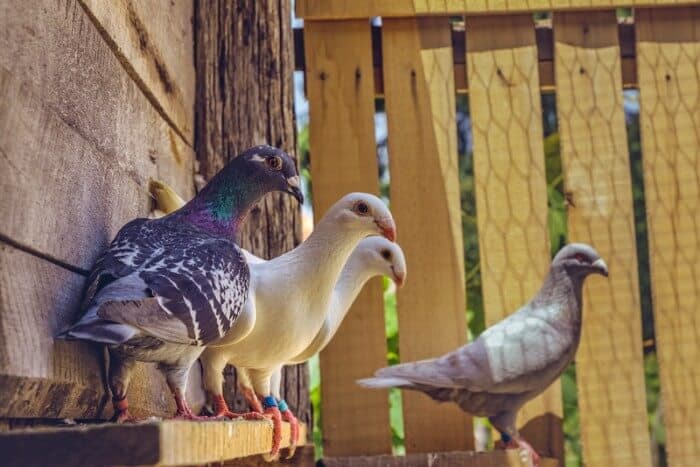Are Pigeons Good Pets? Comprehensive Guide to Benefits, Challenges, and Care

Introduction
Pigeons are often overlooked as companion animals, yet they possess remarkable qualities that can make them rewarding pets for the right household. From their calm demeanor and intelligence to their adaptability in both indoor and outdoor environments, pigeons offer a unique pet experience with distinct benefits and considerations. This guide offers a thorough exploration of what it means to keep a pigeon as a pet, including practical steps, potential challenges, and responsible care solutions. If you’re considering welcoming a pigeon into your home, this article will help you understand what to expect and how to ensure a healthy, enriching life for your feathered companion.
Key Benefits of Keeping Pigeons as Pets
One of the most notable advantages of pigeons is their high intelligence and capacity to form strong bonds with humans. Pigeons can learn household routines, recognize their caregivers, and sometimes even respond to basic training cues. Their memory is impressive-they can remember images for years and read the body language of other birds, making them both observant and interactive companions [1] . Domestic pigeons are generally easygoing, less aggressive than many other birds, and well-suited to life with people and even with other pets, provided their safety is ensured [2] .
Pigeons are also known for their longevity in captivity, often living up to 15 years or more with proper care. This long lifespan means they can offer years of companionship, similar to cats and dogs [1] . In contrast, wild pigeons face many hazards and typically live only a few years. By providing a safe home, you can give a pigeon the opportunity to thrive well beyond what is possible in the wild.
Daily Life and Socialization
As flock birds, pigeons are naturally social and enjoy companionship, whether with other pigeons or humans. If kept singly indoors, a pigeon will often bond closely with its human caregivers, adopting them as surrogate flock members. It is important to note that leaving a pigeon alone for extended periods is stressful and not recommended. Ideally, you should provide either another pigeon or dedicate substantial daily time to interaction and enrichment [4] .
Many owners report that pigeons quickly adapt to family routines, becoming familiar with daily patterns and integrating into household life. Their gentle nature means they can coexist with dogs and cats, as long as precautions are taken to prevent accidental harm. For families with children, pigeons’ docile temperament and lack of biting force make them a safe option compared to hook-billed birds [3] .
Housing and Environment
Pigeons can be kept indoors or outdoors, but each environment has important requirements. For indoor living , pigeons need a spacious enclosure, such as an extra-large dog kennel or double-flight cage. Horizontal space is more valuable than vertical height due to their ground-walking habits [5] . Enclosures should include food and water bowls, enrichment toys, and safe bedding (unscented puppy pads are a popular choice). Daily out-of-cage time is essential for exercise and mental stimulation [2] .
For outdoor housing , a secure, predator-proof aviary is critical. Wire spacing must be narrow enough to prevent entry by predators, and latches should be raccoon-proof. Never house a single pigeon outdoors alone, as this causes stress and loneliness. Outdoor enclosures must also protect against rodents and provide shelter from the elements [4] .
Managing Droppings and Hygiene
One common concern with pigeons as pets is managing their droppings. Healthy pigeon droppings are typically odorless and easy to clean, especially on hard floors. For indoor birds, “pigeon pants”-a harness with a small diaper-can be used to prevent messes when pigeons are out of their cage. Pigeon pants are widely reported to be well-tolerated, though they require regular changing (every few hours) for hygiene [2] . Some owners have success with basic potty training, though results may vary based on the individual bird.
Health and Safety Considerations
Pigeons are generally robust, but there are health risks to consider, both for the birds and their owners. “Bird fancier’s lung,” a form of hypersensitivity pneumonitis, can develop from inhaling proteins in pigeon feathers and droppings. While this is rare and often associated with poor hygiene or large numbers of birds, it is a risk to be aware of. Wearing a filtered mask and maintaining rigorous cleanliness can minimize potential exposure. There is also a minimal risk of zoonotic diseases such as psittacosis, histoplasmosis, and cryptococcosis, but these are rare with proper care and hygiene [1] .
To ensure your pigeon remains healthy, provide a balanced diet (commercial pigeon pellets, seeds, fresh greens), access to clean water, and regular veterinary care from an avian specialist. Watch for signs of illness such as lethargy, ruffled feathers, or changes in appetite and seek prompt veterinary attention if they arise.

Source: celebrateurbanbirds.org
Practical Steps for Getting Started
If you are considering adopting a pigeon, begin by researching reputable pigeon rescue organizations, local shelters, or established breeders. Many rescue groups specialize in pairing pigeons with suitable homes and can provide guidance on care and equipment. When selecting a bird, look for signs of health and vitality, and ask about the bird’s history and socialization.
Prepare your home by setting up a suitable enclosure, gathering supplies (food, waterers, bedding, enrichment), and pigeon-proofing areas where the bird will have out-of-cage time. Connect with online communities and educational resources for ongoing support. For more detailed advice, you can search for “pigeon rescue organizations” or “pet pigeon care” in your preferred search engine, or contact your local animal shelter for referrals.
Potential Challenges and Solutions
While pigeons offer many advantages, they are not the right fit for every home. Key challenges include:
- Mess Management: Regular cleaning and use of pigeon pants or potty training can mitigate droppings, but expect a consistent need for hygiene.
- Social Needs: Pigeons require daily interaction and companionship, so they are not suited to households where they will be left alone for extended periods.
- Health Risks: With good hygiene and veterinary care, health risks are minimal, but potential owners should be aware and proactive.
- Noise: Pigeons coo and make soft sounds, which most find pleasant, but those seeking a silent pet should consider this aspect.
Many owners find these challenges manageable and feel that the affection, intelligence, and unique presence of a pet pigeon far outweigh the drawbacks.

Source: celebrateurbanbirds.org
Alternatives and Additional Resources
For those interested in birds but unsure about pigeons, other domesticated species such as doves or smaller parrots may be considered, each with unique care requirements and temperaments. Consider connecting with local avian societies or rescue groups to meet different birds and learn more before making a commitment.
For step-by-step support on adoption, housing, and care, reputable rescue organizations and avian veterinarians offer guidance. To find these services:
- Search for “local pigeon rescue” or “bird adoption” in your area.
- Contact your nearest animal shelter or animal welfare organization for bird adoption options.
- Consult the Association of Avian Veterinarians by searching for their official website and using their “Find a Vet” tool for specialist care.
Summary and Key Takeaways
Pigeons can make excellent pets for those willing to meet their social, environmental, and health needs. Their intelligence, adaptability, and affectionate nature set them apart from many other pets. With a commitment to proper care, cleanliness, and companionship, pigeons can provide years of joy and meaningful interaction. If you are ready to embrace the unique qualities of these remarkable birds, begin by researching reputable sources, preparing your home, and connecting with experienced owners or rescue organizations for support.
References
- [1] A-Z Animals (2023). Do Pigeons Make Good Pets? Discover the Pros and Cons.
- [2] Palomacy Pigeon & Dove Adoptions (2021). Pigeons As Pets: Outside or Indoors.
- [3] YouTube (2020). Do Pigeons Make Good Pets and Are They Right for You?
- [4] Palomacy Pigeon & Dove Adoptions (2025). How to Care for a Rescued Pet Pigeon (for Newbies).
- [5] Dreaming of a Chance (2023). Keeping A Pigeon As An Indoor Pet.






